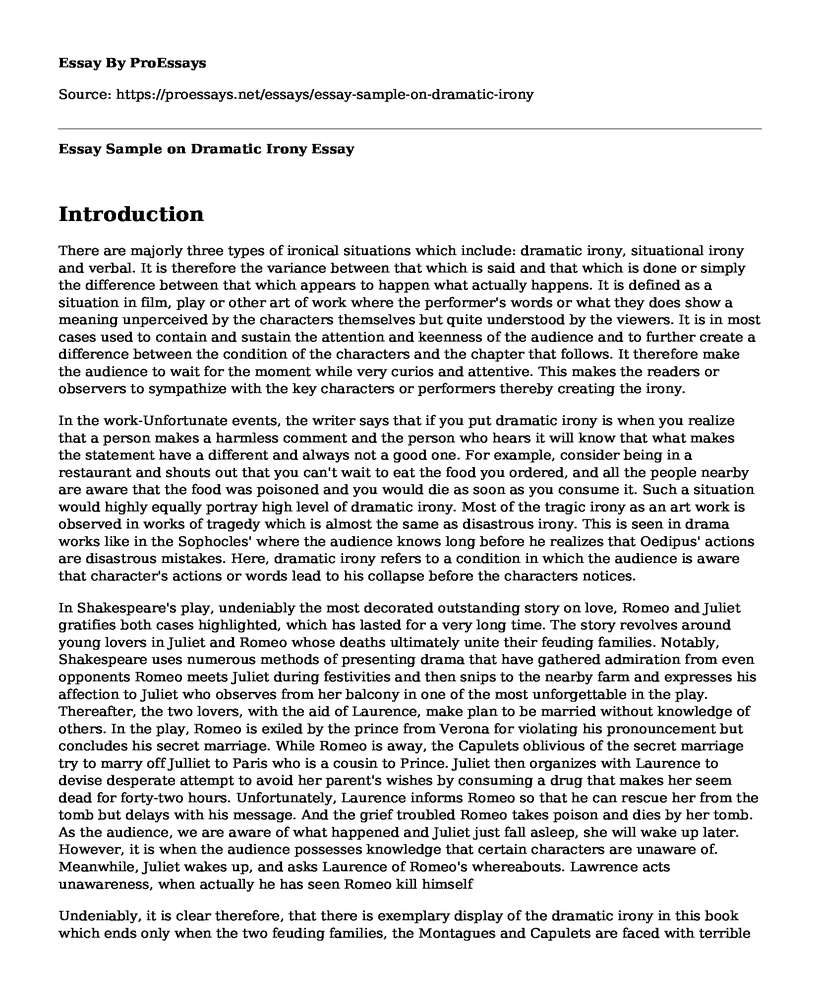Introduction
There are majorly three types of ironical situations which include: dramatic irony, situational irony and verbal. It is therefore the variance between that which is said and that which is done or simply the difference between that which appears to happen what actually happens. It is defined as a situation in film, play or other art of work where the performer's words or what they does show a meaning unperceived by the characters themselves but quite understood by the viewers. It is in most cases used to contain and sustain the attention and keenness of the audience and to further create a difference between the condition of the characters and the chapter that follows. It therefore make the audience to wait for the moment while very curios and attentive. This makes the readers or observers to sympathize with the key characters or performers thereby creating the irony.
In the work-Unfortunate events, the writer says that if you put dramatic irony is when you realize that a person makes a harmless comment and the person who hears it will know that what makes the statement have a different and always not a good one. For example, consider being in a restaurant and shouts out that you can't wait to eat the food you ordered, and all the people nearby are aware that the food was poisoned and you would die as soon as you consume it. Such a situation would highly equally portray high level of dramatic irony. Most of the tragic irony as an art work is observed in works of tragedy which is almost the same as disastrous irony. This is seen in drama works like in the Sophocles' where the audience knows long before he realizes that Oedipus' actions are disastrous mistakes. Here, dramatic irony refers to a condition in which the audience is aware that character's actions or words lead to his collapse before the characters notices.
In Shakespeare's play, undeniably the most decorated outstanding story on love, Romeo and Juliet gratifies both cases highlighted, which has lasted for a very long time. The story revolves around young lovers in Juliet and Romeo whose deaths ultimately unite their feuding families. Notably, Shakespeare uses numerous methods of presenting drama that have gathered admiration from even opponents Romeo meets Juliet during festivities and then snips to the nearby farm and expresses his affection to Juliet who observes from her balcony in one of the most unforgettable in the play. Thereafter, the two lovers, with the aid of Laurence, make plan to be married without knowledge of others. In the play, Romeo is exiled by the prince from Verona for violating his pronouncement but concludes his secret marriage. While Romeo is away, the Capulets oblivious of the secret marriage try to marry off Julliet to Paris who is a cousin to Prince. Juliet then organizes with Laurence to devise desperate attempt to avoid her parent's wishes by consuming a drug that makes her seem dead for forty-two hours. Unfortunately, Laurence informs Romeo so that he can rescue her from the tomb but delays with his message. And the grief troubled Romeo takes poison and dies by her tomb. As the audience, we are aware of what happened and Juliet just fall asleep, she will wake up later. However, it is when the audience possesses knowledge that certain characters are unaware of. Meanwhile, Juliet wakes up, and asks Laurence of Romeo's whereabouts. Lawrence acts unawareness, when actually he has seen Romeo kill himself
Undeniably, it is clear therefore, that there is exemplary display of the dramatic irony in this book which ends only when the two feuding families, the Montagues and Capulets are faced with terrible situation and vowed to put an end to the enmity between their two houses.
Similarly, dramatic irony is greatly portrayed in the book, Snow White and the Seven Dwarfs. Here, the wicked queen mother, not contented with White Snow's beauty organizes the death of the blameless stepdaughter but she later realizes that Snow White is still alive and taking refuge in a hut with other seven friendly little miners. The Queen was highly disappointed and therefore made a decision to poison her with an apple consequently by doing this, Snow White fell into a deep sleep that could only be smashed by a kiss from the prince. There is dramatic irony due to the fact that the queen who plans for the downfall of Snow White is the person whose son must help Snow White through his last kiss. She also plans for her death but she is rescued by seven little miners to her amazement because she knew that Snow White was already dead. Dramatic irony has become quite an interesting art work especially since its unintentional inception by Connop Thirlwall who is credited with developing the modern notion of dramatic irony.
References
Chang, Chia-Lin. "Snow White and the Seven Dwarfs." (1937).
Levin, Harry. "Form and formality in Romeo and Juliet." Romeo and Juliet. Routledge, 2015. 41-53
Cite this page
Essay Sample on Dramatic Irony. (2022, May 16). Retrieved from https://proessays.net/essays/essay-sample-on-dramatic-irony
If you are the original author of this essay and no longer wish to have it published on the ProEssays website, please click below to request its removal:
- Comparative Analysis of Macbeth and Strange Case of Dr. Jekyll and Mr. Hyde
- Analyzing the Duke Vincentio in Shakespeare's Measure for Measure
- Grandmother's Victory by Maya Angelou Essay
- Fate vs. Free Will Theme in Macbeth Book Essay
- Literary Analysis Essay on Shakespeare's Hamlet
- Leadership in Antigone - Essay Sample
- Free Essay Example on The Roaring Twenties







